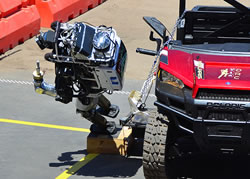Robots Learning Judo Techniques to Fall Down Without Exploding
 By Evan Ackerman for IEEE Spectrum: The best and worst part of the DARPA Robotics Challenge Finals waswatching all of those huge expensive humanoids topple over in a series of epic faceplants. Faceplants are called faceplants because you’re planting your face into the ground as a means of breaking your fall, which usually also breaks your face, among other things. This tends to happen when you’re unprepared for falling, which with most robots, is 100 percent of the time. Now researchers at Georgia Tech want to teach humanoid robots to fall more safely with techniques adapted from judo, which might protect them enough to actually be able to get up again.
By Evan Ackerman for IEEE Spectrum: The best and worst part of the DARPA Robotics Challenge Finals waswatching all of those huge expensive humanoids topple over in a series of epic faceplants. Faceplants are called faceplants because you’re planting your face into the ground as a means of breaking your fall, which usually also breaks your face, among other things. This tends to happen when you’re unprepared for falling, which with most robots, is 100 percent of the time. Now researchers at Georgia Tech want to teach humanoid robots to fall more safely with techniques adapted from judo, which might protect them enough to actually be able to get up again.
Falling safely (or, as safely as you can), assuming that you have very little control over the nature of your fall, is all about controlling exactly when and how your body crashes down. During a fall, your body is busy converting potential energy to kinetic energy, all of which has to go somewhere when you hit the ground. If your face hits the ground first, then that’s where all the energy goes at once, but if you can manage to contact the ground with a bunch of different parts of your body at different times on the way down, the energy will be spread out. Ideally, the energy gets spread out to the point where each individual impact doesn’t do enough damage to hurt you in a permanent sort of way. Cont'd...
Featured Product

